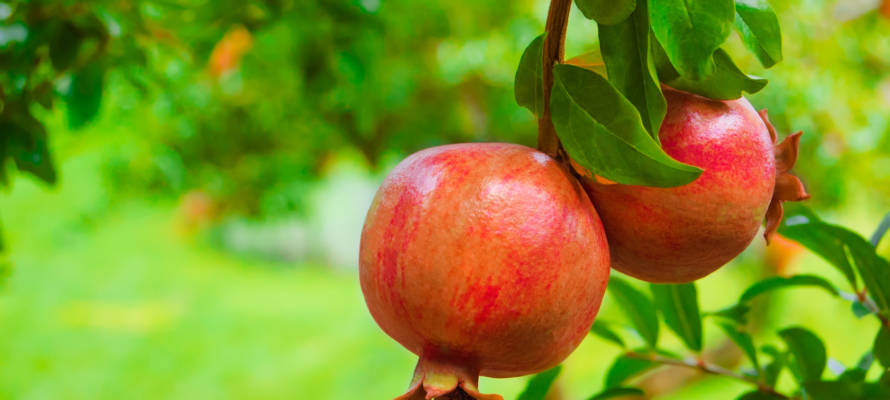What is so special about the pomegranate that it has come to symbolize Rosh Hashana more than others?
By Rabbi Ari Enkin, Rabbinic Director, United with Israel
Ever counted the seeds of a pomegranate? You may have heard that the reason we eat pomegranates on Rosh Hashana is because pomegranates have 613 seeds – the number of mitzvot, or Torah commandments. In reality, though, pomegranates don’t have a set number of seeds. The rabbis recorded the real reason for eating pomegranate on Rosh Hashana: so that our merits may increase like the numerous seeds of this majestic-looking fruit.
But pomegranates aren’t the only thing we eat on this holiday. There are many symbolic foods eaten on Rosh Hashana – dates (that our enemies be destroyed), leeks (that our enemies be cut down), and of course, fish heads (that we should be a head and not a tail!). But none are as entwined with the symbolism of the holiday as the pomegranate, except, perhaps, apples and honey.
Why is this fruit so special that it has come to symbolize Rosh Hashana more than others?
The pomegranate is the last of the seven fruits for which the Land of Israel is praised. Kabbalistically, there are seven sefirot, Divine attributes or emanations, and the seventh in a list corresponds to the seventh sefira, which is malchut – kingship. Rosh Hashana is the day when the shofar blasts symbolize G-d’s coronation, and the pomegranate, with its regal crown and jewel-like fruit, is just the fruit for this special day.
Take a look at the pomegranate’s crown. What shape does it form? With six triangles arranged in a circle, it’s a Star of David, the classic shape to represent malchut – with six sides representing the preceding six sefirot and the center representing the seventh aspect of malchut.
But if the crown normally sits atop the head of the king, the crown of the pomegranate faces downward, toward the ground. (This is how it grows on the tree. How you arrange it on your table is a different matter). The garments of the High Priest included a robe adorned with bells and woven pomegranates along its hem – almost sweeping the ground as he walked. The last of the seven fruits, it seems the pomegranate bears a descending theme – why?
“Your brow behind your veil is like a pomegranate split open,” says the verse in Song of Songs. The Rabbis teach that this is a reference to the “empty” and lowly Jews. Even the simplest of Jews, teach the Rabbis, is as full of good deeds as a pomegranate is full of seeds. The pomegranate, reaching down toward the earth, teaches us that even at the lowest point, there is so much goodness. On Rosh Hashana, we ask G-d to judge us favorably by seeing how much goodness is within us, despite our sins.
The Talmud records that Rabbi Meir ate the seeds of a pomegranate and disposed of the rind. The pomegranate is externally beautiful, but its skin is inedible. Peel back the thick, rubbery external, and you reveal the hidden treasure; as the verse says, “behind your veil.” Rabbi Meir was able to discard the negative aspects and discover those hidden, positive aspects, even in the lowliest of Jews. This is what Rosh Hashana is all about – we eat pomegranate seeds and pray that, like Rabbi Meir, G-d discard our external peel and focus on our internal goodness, to “increase our merits.”
Each seed of the pomegranate is like an individual gem, but the thick, rubbery skin binds them all together into a single, unified fruit – just like the Jewish people are a single nation comprised of precious individuals. On Rosh Hashana, we are judged both on an individual level and on a national level.
The fact that in Israel pomegranates ripen just around Rosh Hashana time is no coincidence. Pomegranates are a Rosh Hashana fruit in the deepest sense. This year, eat your pomegranate with a renewed appreciation of the hidden jewels within each Jew and within yourself.

Send Passover Packages to Needy Israeli Soldiers - Bring Them Joy!
We are honored to thank the young men and women of the IDF who risk their lives every day to protect the citizens of Israel. Since October 7th, soldiers have been on the battlefield for months - many are hoping to come home for Passover.
Join us in sending Passover food packages (and personal notes) to Israeli soldiers and their families.
Many soldiers spend the Passover holiday with needy families back home. The soldiers greatly appreciate your love and concern. Bring them Passover joy!
CLICK HERE TO SEND YOUR PACKAGE AND NOTE TO ISRAELI SOLDIERS!




